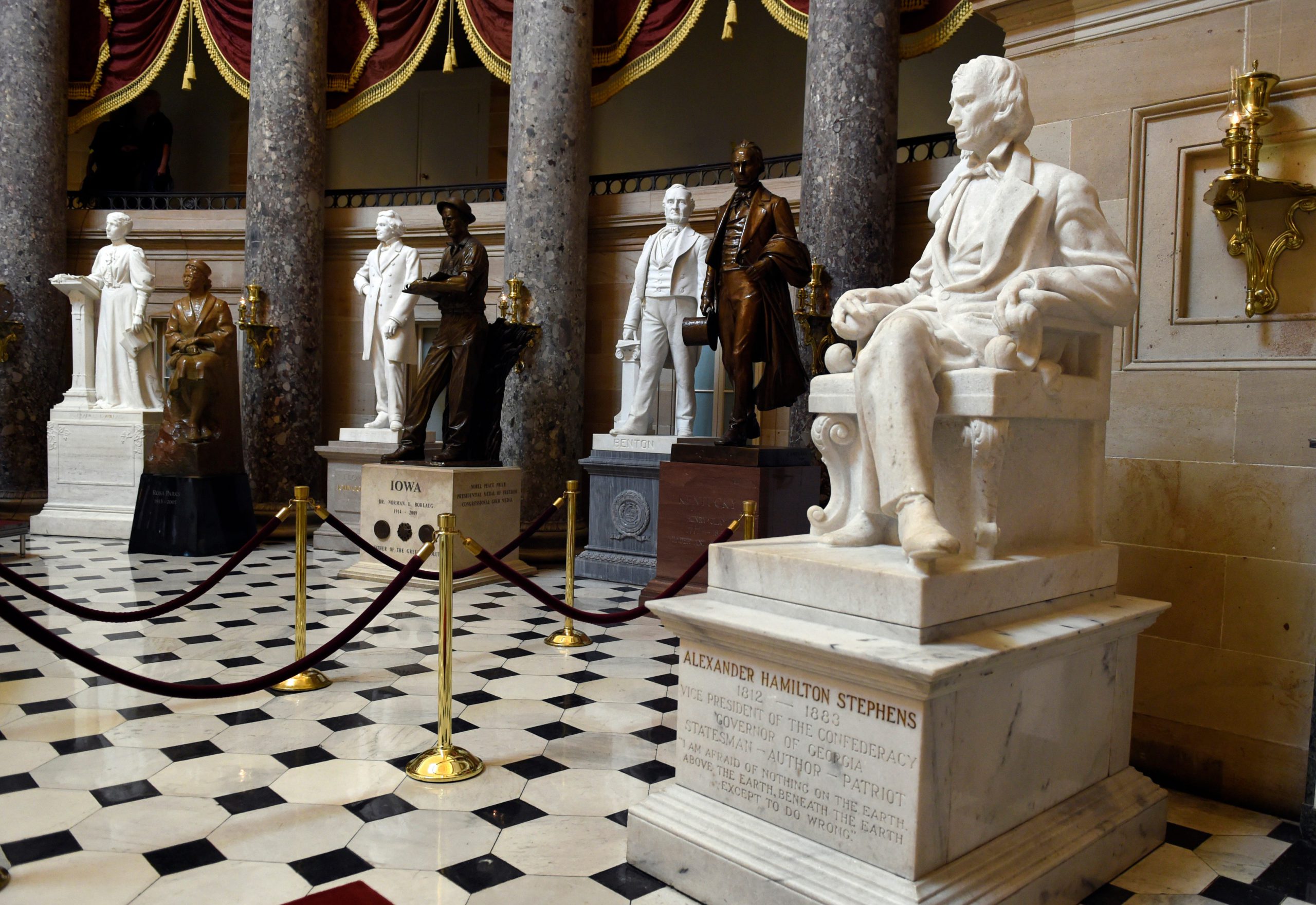

WASHINGTON: The House on Tuesday will vote on a bill that would remove Confederate statues from the U.S. Capitol, including a bust of a former Supreme Court chief justice.
The legislation would require states to remove and replace any statues honoring members of the Confederacy in the National Statuary Hall Collection in the Capitol by prohibiting "persons who served as an officer or voluntarily with the Confederate States of America or of the military forces or government of a State while the State was in rebellion against the United States" from the collection.
The House passed similar legislation last year, but it stalled in the Republican-controlled Senate. It faces a greater chance of passage now that Democrats hold the majority.
House Majority Leader Steny Hoyer, D-Md., reintroduced the legislation in May, and said then that "it’s never too late to do the right thing, and this legislation would work to right a historic wrong while ensuring our Capitol reflects the principles and ideals of what Americans stand for."
Each state contributes two statues of people of historical importance to be displayed in the Capitol's National Statuary Hall – ranging from Revolutionary War hero Ethan Allen from Vermont, to Helen Keller from Alabama.
The bill calls for the removal of a bust of former Supreme Court Chief Justice Roger Taney, who wrote the Dred Scott decision in 1857, which declared slaves were not citizens and did not have the right to sue.
Taney's bust, which sits inside the Old Supreme Court Chamber in the Capitol, would be replaced with one of Thurgood Marshall, the first African American Supreme Court justice.
Fact check: Viral post on Supreme Court's Dred Scott ruling includes inaccuracies
The bill also would remove statues of former Vice PresidentJohn C. Calhoun, North Carolina Gov.Charles B. Aycock and Arkansas Sen. John P. Clarke, whom the legislation identifies as playing a major role in defending slavery and segregation.
The legislation would remove the statues from being publicly displayed. If they were provided by a state — for example, Calhoun was provided by South Carolina — the Architect of the Capitol, the office tasked with preserving the Capitol, would send the statues that are removed from public display back to the states. Those states would be allowed to replace it.
Any bust or statue that is removed and not owned by a state would be left up to the Architect of the Capitol to address.
Tuesday's vote comes after a year of nationwide protests over racial injustice, spurred by the death of George Floyd, a Black man who was killed by a white Minneapolis police officer, Derek Chauvin. Chauvin was recently sentenced to more than 20 years in prison for Floyd's murder.
Confederate monuments have reemerged as a national flash point since Floyd's death: more than 90 Confederate monuments were taken down or moved from public spaces in 2020, according to February data from the Southern Poverty Law Center.
Nearly 800 Confederate monuments were in the U.S. at the beginning of 2020, a number that dwindled to about 700 by the end of last year.
More:Nearly 100 Confederate statues were removed in 2020, but hundreds remain, new SPLC data shows
Like other symbols of the Confederacy, such memorials have been defended for generations as pieces of Southern heritage, or artifacts of history. But for many people, they are ever-present reminders of racial discrimination and violent oppression that has never gone away.
Hoyer told reporters Tuesday the legislation "is to dishonor hate."
"We cannot forget that we had hate. We cannot forget that segregation and slavery existed, nor should we, but we ought not to honor those who pursued those efforts, particularly during the Civil War and leading up to the Civil War," he said. "We can't change history, but we can certainly make it clear that which we honor and that which we do not honor. Symbols of slavery sedition and segregation have no place in the halls of Congress."
The Capitol has 10 remaining Confederate statues, a few of which are already in the process of being removed and replaced by the states that sent them there.
A statue of Confederate Gen. Robert E. Lee statue that stood in the U.S. Capitol on behalf of the state of Virginia for 111 years was removed and taken to a museum in Richmond in December, per the request of Virginia state leaders.
More:House overwhelmingly votes to make Juneteenth a federal holiday, sending bill to Joe Biden
More:Qualified immunity divides lawmakers in police reform talks. What is that legal defense?
In 2020, House Speaker Nancy Pelosi, D-Calif., ordered the removal of four portraits in the U.S. Capitol of former House speakers who served in the Confederacy.
Many protesters and activists have demanded the removal ofConfederate statues in cities across the country, and renaming military bases honoring Confederate military leaders, and Republicans have expressed some openness.
However, other Republicans, including former President Donald Trump have vehemently denounced such ideas.
If the legislation passes the House Tuesday, it goes to the Democrat-led Senate.
The bill would need 10 Republican Senators to join every Democrat to pass the upper chamber.
Some Republicans Senators have expressed hesitation about removing the statues, like Minority Leader Mitch McConnell, R-Ky., who said in 2020 that "What I do think is clearly a bridge too far is this nonsense that we need to airbrush the Capitol and scrub out everybody from years ago who had any connection to slavery."
The Senate overwhelmingly passed a massive defense bill last July that included the removal of Confederate names from military bases, defying Trump, who opposed the move.
Contributing: N'dea Yancey-Bragg, Christal Hayes
Follow Savannah Behrmann online @SavBehrmannDC









